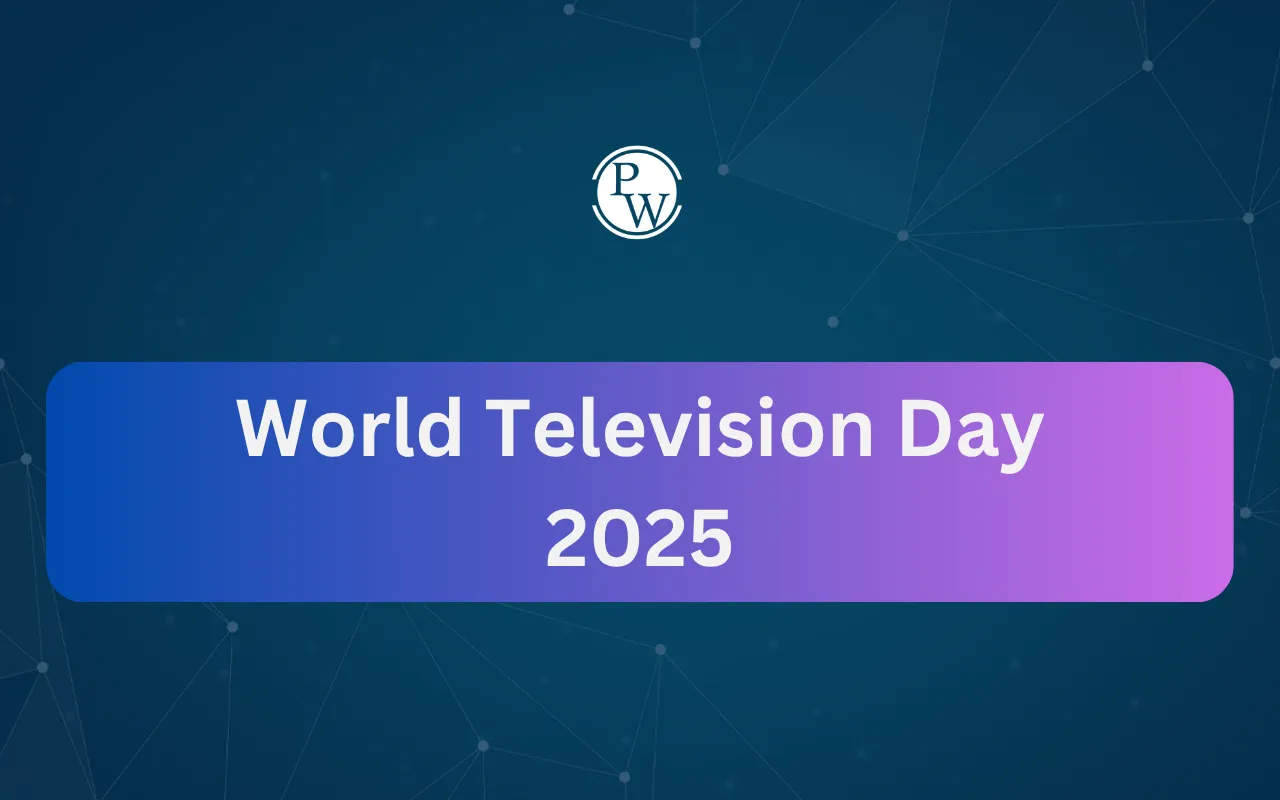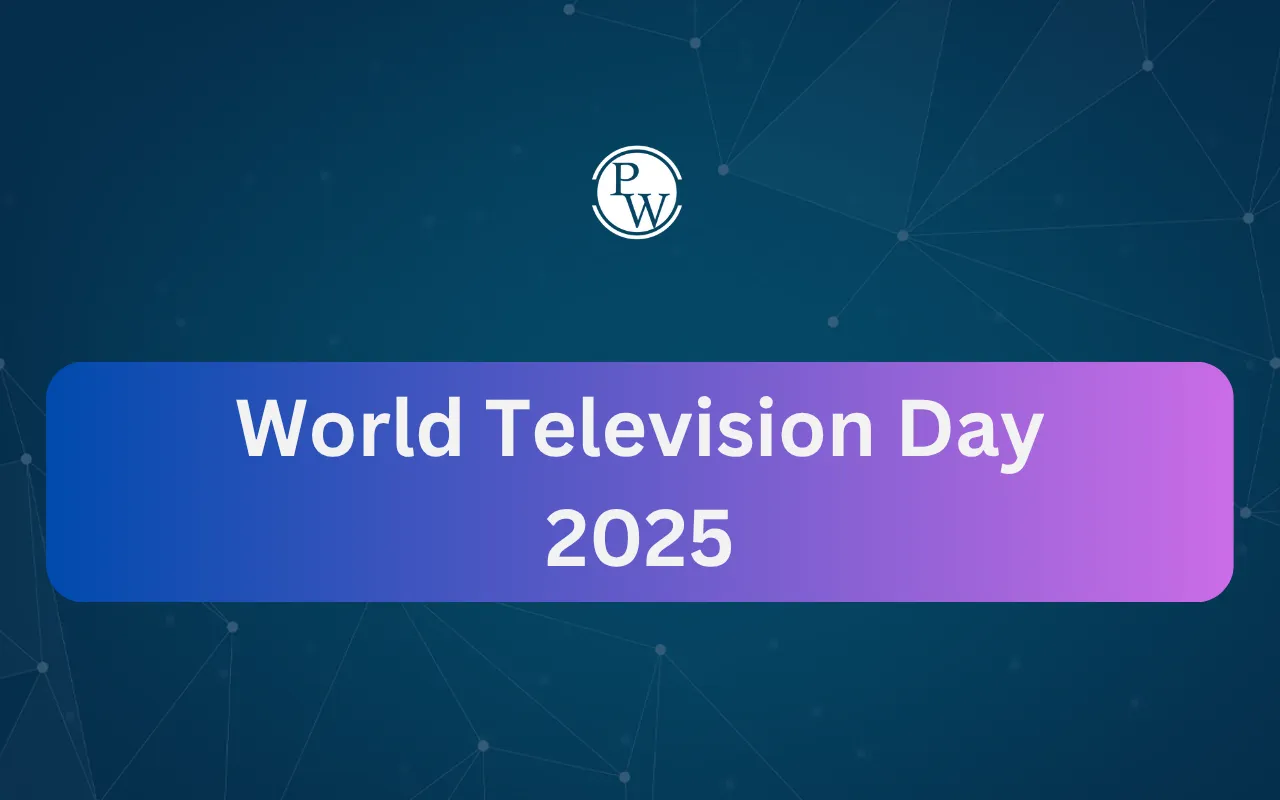World Television Day 2025 is celebrated on November 21 every year. The United Nations created World Television Day to highlight how television has transformed intercultural communication, education, entertainment, and information sharing.


World Television Day 2025, annually on November 21, is a global celebration of television's effect on modern life. This day, which was established by the UN, emphasizes how television has revolutionized cross-cultural communication, education, entertainment, and information exchange.
The celebration brings attention to how television helps people interact, develop media literacy, and advance social development worldwide. World Television Day continues to emphasize the power and responsibility that this medium carries in our connected age, from broadcasting breaking news to showing other cultures.
World Television Day 2025 Theme
Every year, World Television Day highlights a major issue that represents the prospects or difficulties in the television industry. Although the United Nations has not yet officially announced the subject for World Television Day 2025, previous years' themes have included "Television as a Trusted Friend" and "Information, Empowerment, and Connectivity."
Significance of World Television Day
Television is a symbol of globalization that crosses language, cultural, and geographic barriers, along with being a source of information. It unites people all over the world through news broadcasts, documentaries, and educational initiatives, influencing public opinion and promoting a feeling of humanity.
The potential of television for addressing social concerns, including poverty, gender equality, and environmental sustainability, is highlighted on World Television Day. It brings together broadcasters, producers, and media specialists to investigate how television can promote social progress and peacebuilding.
World Television Day 2025 History
The United Nations General Assembly's decision in December 1996 to select November 21 as the day of celebration marked the beginning of World Television Day. This date was selected to honor the first World Television Forum, which took place in 1996 and brought together world leaders and television professionals to examine and acknowledge the increasing influence of television on society and decision-making.
Introduction of Television in India
Television made its debut in India in 1959, first as an educational medium over the All India Radio (AIR) network. The original transmissions were limited to educational content aimed at schoolchildren and farmers, demonstrating the medium's potential for societal growth.
The Era of Colour Broadcasting
The launch of color broadcasting during the Asian Games in Delhi in 1982 marked a new era for Indian television. Television became an essential part of life and reached a wider audience as a result of this technological development.
Satellite Television and the Media Boom
The satellite revolution of the 1990s led to the establishment of several channels that specialized in news, entertainment, and local programming, therefore diversifying the television landscape. India's strong media and broadcasting sector, which is still going strong now, was founded during this time.
World Television Day 2025 Quotes
Television serves as a standard for reliable journalism and educational content in the current digital era, as social media often circulates false or inaccurate information. World Television Day emphasizes how crucial it is to provide excellent programming that empowers, informs, and educates people.
-
“Television is chewing gum for the eyes.” Frank Lloyd Wright
-
“I believe that good journalism and good television can make our world a better place.” Christiane Amanpour
-
“Television is a medium because anything well done is rare.” Fred Allen
-
“Television is a medium of entertainment that permits millions of people to listen to the same joke at the same time and yet remain lonesome.” T. S. Eliot
World Television Day 2025 FAQs
When is the 2025 World Television Day celebrated?
November 21st has been declared as World Television Day 2025
Who was the first to invent the television?
Philo Taylor Farnsworth created the first television in 1927.
When was the first World Television Day observed?
In 1996, the UN General Assembly established World Television Day.
What distinguishes National Television Day from World Television Day?
World Television Day is celebrated globally on November 21, but other nations can celebrate extra National Television Days to highlight their own broadcasting achievements. The United Nations' World Television Day emphasizes the influence of television on all people.
Free Learning Resources
PW Books
Notes (Class 10-12)
PW Study Materials
Notes (Class 6-9)
Ncert Solutions
Govt Exams
Class 6th to 12th Online Courses
Govt Job Exams Courses
UPSC Coaching
Defence Exam Coaching
Gate Exam Coaching
Other Exams
Know about Physics Wallah
Physics Wallah is an Indian edtech platform that provides accessible & comprehensive learning experiences to students from Class 6th to postgraduate level. We also provide extensive NCERT solutions, sample paper, NEET, JEE Mains, BITSAT previous year papers & more such resources to students. Physics Wallah also caters to over 3.5 million registered students and over 78 lakh+ Youtube subscribers with 4.8 rating on its app.
We Stand Out because
We provide students with intensive courses with India’s qualified & experienced faculties & mentors. PW strives to make the learning experience comprehensive and accessible for students of all sections of society. We believe in empowering every single student who couldn't dream of a good career in engineering and medical field earlier.
Our Key Focus Areas
Physics Wallah's main focus is to make the learning experience as economical as possible for all students. With our affordable courses like Lakshya, Udaan and Arjuna and many others, we have been able to provide a platform for lakhs of aspirants. From providing Chemistry, Maths, Physics formula to giving e-books of eminent authors like RD Sharma, RS Aggarwal and Lakhmir Singh, PW focuses on every single student's need for preparation.
What Makes Us Different
Physics Wallah strives to develop a comprehensive pedagogical structure for students, where they get a state-of-the-art learning experience with study material and resources. Apart from catering students preparing for JEE Mains and NEET, PW also provides study material for each state board like Uttar Pradesh, Bihar, and others
Copyright © 2025 Physicswallah Limited All rights reserved.
Get App
